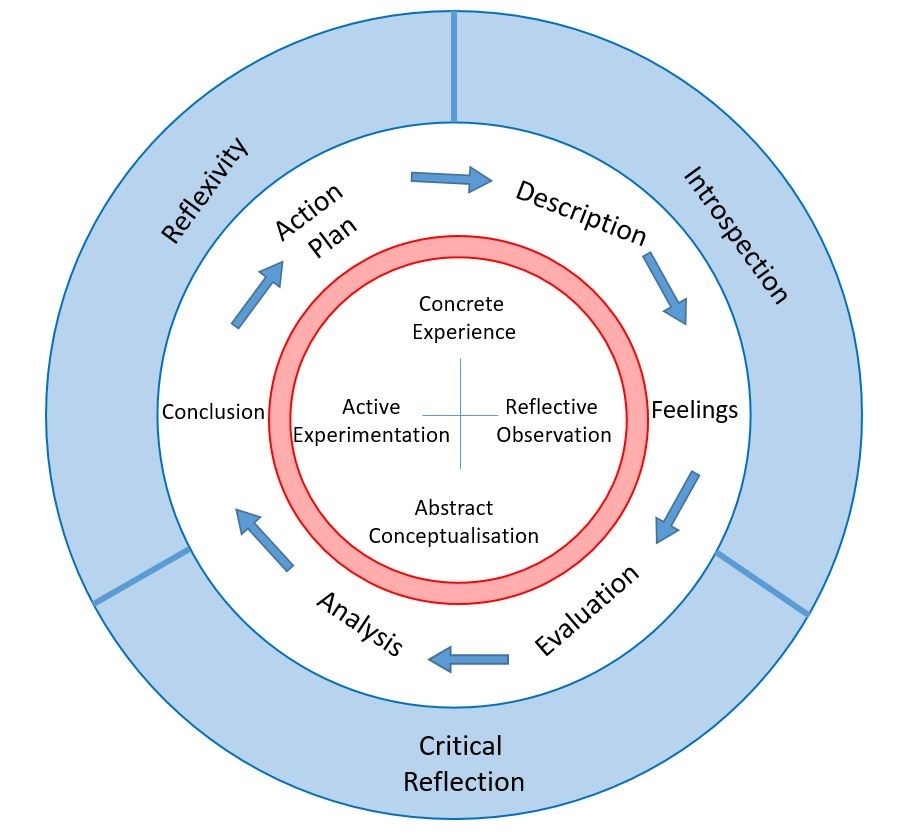Chris Whiting, Professional Development Adviser, Learning and Teaching Development Service
The importance of reflection and the importance of writing.
Learning is not exclusive to education. It is something we start engaging with as babies and will continue to engage with every day for the majority of our lives. It is, in many small ways, a daily activity and in these small ways goes unconsidered, like breathing. Acquiring new knowledge and skills may require us to consider how we are learning, but the developing and refining of knowledge and skills is often allowed to pass without a second thought.
David Kolb’s widely accepted theory of the experiential learning cycle (1984) presents learning in four stages: Concrete Experience; Reflective Observation; Abstract Conceptualisation; and Active Experimentation. Graham Gibbs’ (1988) Reflective Cycle expands on these four stages with six prompts that develop our thinking behind this learning experience: Description; Feelings; Evaluation; Analysis; Conclusion; Action Plan. Finlay (Finlay, 2008, 2003, Finlay and Gough, 2003) offers a comparable mode of thinking about reflection in three stages: Introspection; Critical Reflection; and Reflexivity. Finlay further emphasises the importance of progressing through the entire cycle so that reflections do not simply reaffirm current beliefs (introspection) or lack a productive outcome (introspection and critical thinking).

Whichever way you find most comfortable to think about reflection (and there are other modes and models available), a thorough and complete reflection of experience is a powerful tool to fuel, enhance and motivate your learning. As such, reflective skills are an essential aspect of developing autonomous learners so that they can guide and drive their learning within and beyond formal education.
But if reflection is a mental exercise then why do we need to write?
Essays, theses, compositions, experiments, etc… are all products of mental exercises but are not explicitly derived from them. That is to say, we do not write essays in our heads. We think, write, edit, think, write, edit… until we are satisfied (or we hit our deadline). Our thinking diverges and converges. The essay is a product of both thinking and writing, and it is through writing that it comes into being and is refined. As we write we enter into a learning experience. We read our words and ask ourselves: ‘are we happy with this?’; ‘does it say what it needs to say?’; ‘could it be improved?’ and we take actions based on our answers. The writing is therefore an extension of our thinking. It allows us to scrutinise our reflections in a way that it is extremely difficult to achieve as a mental exercise.
Further to this, thinking is a fleeting experience and only relevant to the moment. When the idea is committed in writing, it commits you to a reflexive action (more so than just thinking) and is a marker from which you can trace your learning and navigate in the direction that you are intending.
Finlay, L. 2003. The Reflexive Journey: Mapping Multiple Routes. In: Finlay, L. a. G., B. (ed.) Reflexivity. Oxford: Blackwell Publishing.
Finlay, L. 2008. Reflecting on ‘Reflective Practice’. Practice Based Professional Learning Centre. January 2008 ed. Milton Keynes: The Open University.
Finlay, L. & Gough, B. 2003. Reflexivity: A Practical Guide for Researchers in Health and Social Sciences, Wiley.
Gibbs, G. 1988. Learning by Doing: A Guide to Teaching and Learning Methods, FEU.
Kolb, D. 1984. Experiential Learning: Experience as the Source of Learning and Development, New Jersey, Prentice Hall.
